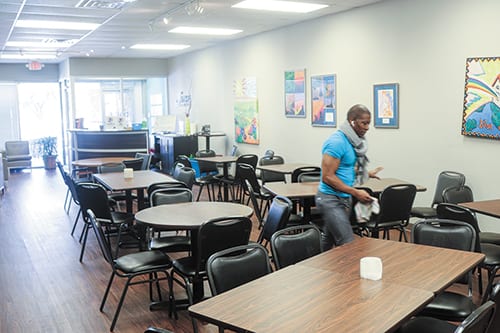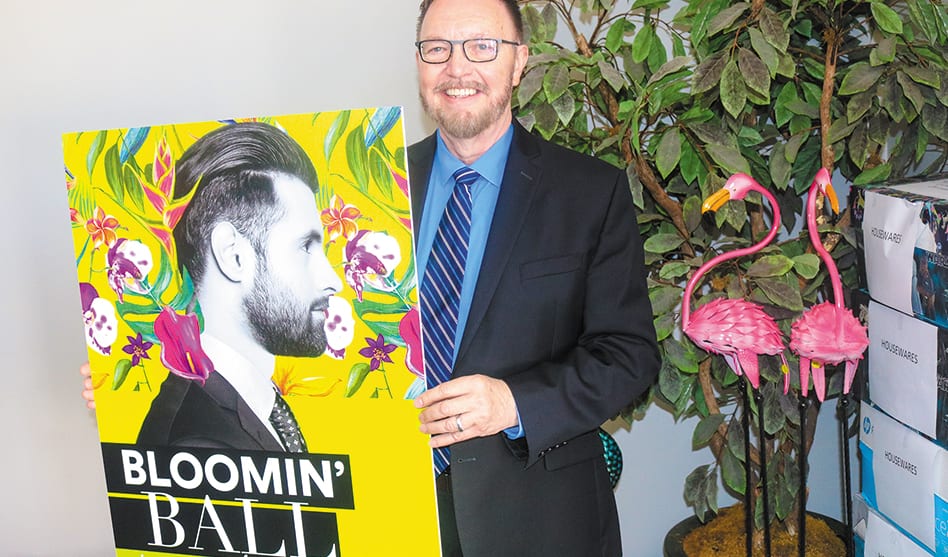Steven Pace
Steven Pace’s varied career experiences contributed to his successful 20-year run as AIN’s executive director
DAVID TAFFET | Senior Staff Writer
taffet@dallasvoice.com
Steven Pace started his working life in the family business, a rural cafe in a small town in Missouri. From there, he became a restaurant and bar manager in 70s-era fern bars in Springfield and Branson.
While those early jobs may seem a far cry from his job now, Pace said each position he’s ever held contributed to how he’s been able to raise money and sustain programs at Access and Information Network, formerly AIDS Interfaith Network and now simply known as AIN.
“We had big happy hours and bands on Fridays,” Pace said of his fern bar job. That hospitality background made planning events like AIN’s upcoming Bloomin’ Ball easier. And creating AIN’s breakfast and lunch programs were second nature to him.
Pace is about to begin his 21st year at the helm of AIN, the longest tenure of any North Texas AIDS organization CEO since the recent retirement of Don Maison from AIDS Services Dallas. Pace has headed AIDS programs and organizations longer than anyone in the country when you add in his experience with such organizations and programs prior to joining AIN.

The Daire Center at AIN
Although Pace grew up in a Pentecostal family, he had walked away from his religion as a teen and came out as gay at 18 as he was graduating high school.
He decided in his 20s to move to a larger city, narrowing his choices down to New York, San Francisco and Dallas. To someone from rural Missouri, New York and San Francisco may have been a little intimidating, but Dallas felt right. And he already knew a few people here.
So, in 1980, Pace moved to Texas where he planned to live his life as an openly-gay man.
Pace said that his family accepted him when he came out to them. His father, who came and went from religion, had fewer objections than his mother. His three brothers and his sister all already knew on some level.
As for Pace himself, he said his attitude toward religion had always boiled down to “I’ll leave you alone if you leave me alone.” But then he began attending MCC of Dallas, located then on the corner of Reagan and Brown where Resource Center’s Health Campus now stands. He was, he said, amazed to find a denomination that embraced LGBT people and welcomed them to the table.
“As a child I had a call” to the ministry, he said. “I didn’t or couldn’t act on it, and then I walked away. At MCC, that reawakened.”
Pace went through MCC’s ordination process at the time, which included completing a specified amount of theological study. But at the time, seminaries had students sign morals clauses that prohibited gay seminarians. “That,” he said, “created an ethical dilemma.”
So Pace chose to study through Samaritan Institute, which required an internship supervised by a church. He did his internship at MCC Dallas, which under the leadership of Don Eastman was a hub of activity. And Pace was right in the middle of it.
As Pace was going through the process to become an ordained minister, the AIDS crisis came to Dallas.
“Life already wasn’t easy for LGBT people,” Pace said, describing life in Dallas at the beginning of the AIDS crisis. “Bars were being raided. Police were taking down license plate numbers in the church parking lot. It wasn’t unusual for the KKK to show up at church.”
Many MCC Dallas members found themselves disowned by their families when they were diagnosed with AIDS. Even a lay minister at MCC contracted the virus.
And fear of AIDS infected every aspect of life, for those with the virus and those around them. Pace described visiting people in hospitals where hospital staff left food trays outside patients’ doors out of fear they might contract the disease if they went into the room.
“The first time I took [an AIDS patient’s] hand, we didn’t know how HIV was transmitted,” he recalled, adding that it was during that visit that he realized caring for people with AIDS was going to be part of his life from then on.
“That was the moment I was called to do this,” Pace said, adding that the people he visited at Parkland Hospital who were dying begged him, “Do something about this so other people don’t have to go through what I’ve been through.”
Over the next few years, Pace said, he watched almost all of his friends die. “By the time I reached my 40th birthday, all but three or four of my friends had died,” he said.
And at MCC, he was conducting or attending as many as three funerals a day.
As he battled on the front lines of the epidemic, Pace put aside the idea of ever having much of a personal life. But at the height of the AIDS crisis, he met Duane Trammell. They’ve been together now for 32 years.
At the same time he was training as a minister, Pace worked in the Design District where, once again, a job unrelated to working at an AIDS organization taught him a skill he needed to run an AIDS agency. “They could create and produce, and I could put it on paper,” he said of his job in the design industry. “That became the proposal and grant writing piece” of work in the AIDS services field.
Pace decided to continue his education and attended UT Arlington, earning a bachelor’s degree and then a master’s degree in social work.
Later, Pace attended the opening of Howie Daire’s and Candy Marcum’s counseling center, the organization that evolved into became Oak Lawn Community Services. That organization renovated two houses on Nash Street where the entrance to Cathedral of Hope from Inwood Road is now. But after all of their work, the landlord broke the lease.
So Pace began working with Mike Merdian and Daryl Moore, the founders of the PWA Coalition, and they purchased a house in Oak Cliff where they could provide housing for people living with AIDS. That organization became AIDS Services Dallas.
Pace became the director of HIV services for OLCS in 1996. Then when OLCS ran into financial trouble in the late 1990s, Pace began working at AIDS Interfaith Network. His experience with some of the programs at OLCS — the Buddy Project, transportation, the Daire Center, meals, case management — eased the transition when OLCS closed at the end of 1999 and those programs moved to AIN.
With that transition, AIN went overnight from being a small agency with 300 clients focused on connecting church groups with programs like ASD’s supper clubs or with people with HIV who needed care teams to help them live, to being an agency with 1,100 clients.
Since Pace became head of AIN, the organization has evolved many times, “always toward the populations with the greatest need,” he explained. One of the major concerns now is caring for people with HIV as they age.
Half of the people who are HIV-positive today are 50 years old or up, and half of those people are 60 and older. Now people with HIV are facing heart conditions, diabetes and other issues people normally encounter as they age.
Pace said he is also encountering a whole new generation of young people who are less aware of healthcare. As co-pay costs have risen and insurance has become more unaffordable, parents haven’t been able to afford regular doctor visits for their children.
As it has been since the AIDS crisis began, funding is a constant concern. “Two thirds of our funding comes from [federal] government grants,” Pace said, and policies that change with the whims of whatever administration is in charge in Washington, D.C., makes an organization like AIN vulnerable.
About $600,000 of AIN’s budget comes from other sources. Among those sources of valuable unrestricted funds is AIN’s signature event, Bloomin’ Ball.
This year’s Blooming Ball takes place on Saturday, June 1 at the Dallas Renaissance Hotel. Everyone from clients to a wide range of donors — including church groups as well as members of the LGBT community and corporate sponsors — mix at what Pace called “an inclusive event.”
The event is not so formal as to be intimidating, but it is dressy, Pace explained. There is a wide variety of silent auction items at a range of prices, and there is an entertaining two-hour program.
“Bloomin’ Ball is just another way we bring diverse people together,” Pace said. “The event speaks to who we serve. Those people need to know other people care.”
While Pace’s work has been recognized in the past, he has received two awards over the last year that were, he said, particularly meaningful: His board presented him with a Lifetime Achievement Award and has named the award that will be presented in the future for him, and he received D Magazine’s Nonprofit and Corporate Citizenship Award for Leadership Excellence.
And while he already has earned recognition for his longevity in the field of AIDS service organizations, Pace isn’t done yet. AIN still has work to do, and he is there to keep helping that work get done.













